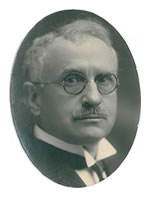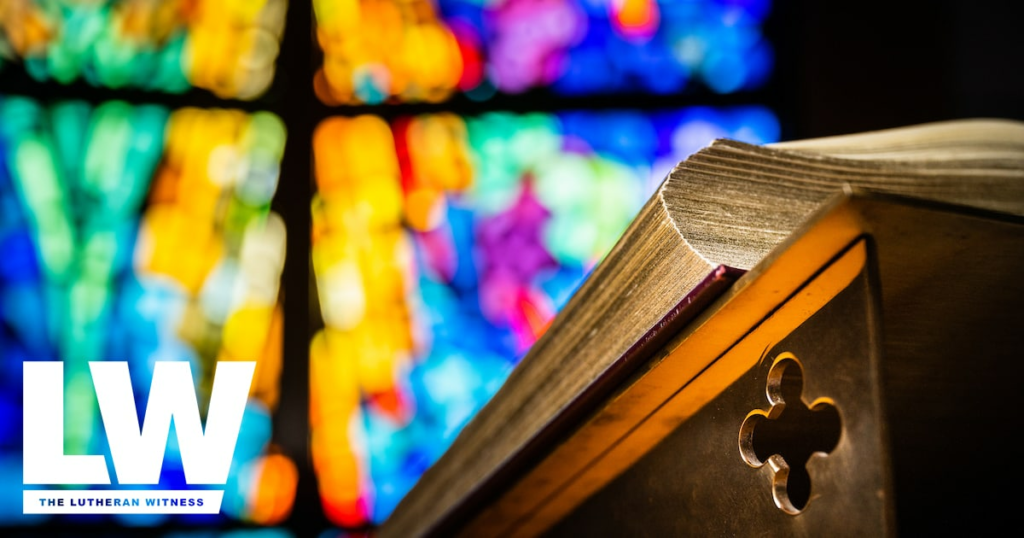by Martin S. Sommer
Editor’s note: Along with Prof. Theodore Graebner, Prof. Martin S. Sommer shared the editorship of The Lutheran Witness for 35 years, from 1914 to 1949. This column is from 75 years ago, Jan. 1, 1935, in many respects, a time not unlike our own–economic uncertainty, high unemployment (more than 20 percent in 1934–35), and debate about, among other things, church relations, social issues, and the role of government in the lives of citizens. Then as now, Prof. Sommer reminds us of the true path to happiness and contentment.
The editors and publishers of The Lutheran Witness wish all its readers a happy New Year. But more than that, we believe that thousands of its readers, if they could meet with other readers, would also wish them a happy New Year. Best of all, God Himself not only wishes us a happy New Year, but He is ready to bestow it upon us if we will only receive it. So sincere is God in His desire that we should have a happy New Year that He has told us exactly in what way we may receive the desires of our heart. He has said to all: “Delight thyself also in the Lord, and He shall give thee the desires of thine heart” (Ps. 37:4).
 |
|
Rev. Martin S. Sommer |
Here, then, is God’s infallible prescription for happiness. Every one who follows this direction will be able to say: “My cup runneth over.” Indeed, happiness will actually pursue him, so that he may say: “Goodness and mercy shall follow me all the days of my life.” God’s goodness will provide him with everything that he needs, and God’s mercy will forgive all his sins and graciously help him out of all his troubles; these two angels of God will continually follow him and never leave him.
Of course, God will not give you happiness if you run away from it and seek it where it is not to be found. We shall never find happiness in sin. God will not make you happy if you devote your life to making other people unhappy. You will not find happiness in delighting to injure others. “Delight thyself in the Lord,” that is God’s direction.
Be sure of this, that all those who seek happiness in wickedness are blinded by Satan. They shall fall in the dark and “know not at what they stumble” (Prov. 4:19). They are doomed to destruction. To them we say: O man, O woman, you are destroying yourself. Why? Because you are not seeking happiness at that Fountain from which alone all blessings flow. That is the Lord. Turn from your sin and delight yourself in the Lord.
But what delight is to be found there? The first delight is this, that you learn there from God’s holy Word that the gracious Father in heaven has created you and given you your physical and mental powers. Moreover, He has given you an immortal soul; He has created you a human being. You are the most precious visible creature of God. God has therefore forewarned all men not to do you any harm. God allows us to kill any animal, but He allows no one to kill you. He allows any one of us to trap, to shoot, or to drive off, and exterminate, any animals; but God has strictly forbidden any one, no matter how high his station, to injure you in the least. He commands all men, high and low, to love you as they love themselves. He has told all men to be of help and service in keeping what you have. He has threatened punishment to those who undertake to deceive or to cheat you. He has even threatened to tear any one to pieces who dares to speak evil of you (Ps. 50:22).
Then you learn from this same source of blessing that God loved you even unto death. He sacrificed His Son for you. The Holy Spirit comes into your filthy, wicked, sinful, and corrupt heart and cures it, heals it, purifies it. He makes of that which was a cesspool in which the devils dwelt a holy temple in which the Triune God abides. Isn’t that a joy to think of?
And now, all this that He has done for you is only the beginning of His blessings. He has promised–and He certainly will keep His promise–to give you a perfect body, free from all ills and pains, to provide for you not only some joys, but fullness of joy, so that there is absolutely nothing lacking to make you perfectly happy. He has promised to provide you with company more delightful than any person ever found on this earth. God is going to provide you with companions that are absolutely free form all sin, folly, or deficiencies of any kind. You are to live with the saints made perfect, whom you will love with a greater love than you loved any one on this earth and who will love you as no person ever loved you here upon this earth.
Delight yourself in the Lord, and your best days are yet to come. This wonderful God, who made heaven and earth, is going to create a new heaven and a new earth, in which dwelleth righteousness. The Holy City, the new Jerusalem, is coming down from God out of heaven. God Himself will dwell with us, God Himself “shall wipe away all tears from our eyes; there shall be no more death, neither sorrow nor crying, neither shall there be any more pain; for the former things are passed away” (Rev. 21:4).
Believe this, and you will be happy in the new year, let come what will. For who that believes these things could be unhappy? How happy our children are, looking forward to Christmas, to the tree, to its lights, to the presents, to the good things, and to the joys and the services of God’s house! And yet, how imperfect all these things are! How quickly they vanish! And should we not be far happier when we think of the perfect and the unnumbered things that are awaiting us? Should we not say: “My heart for very joy doth leap, My lips no more can silence keep”? “O that I had a thousand voices” to express, to sing, to proclaim, to shout, not only what good things God hath done for us, but what better and best things He still has in store for us.
Let therefore this new year bring what it may, that almighty God who has power over all things, whom nothing can resist, will see to it infallibly that all things, whatever may happen, must work together for our good. He Himself is preparing a place for us. There will be no regrets there. Everything will be just as it should be, and there will be no interruption of our joys. It is just a little while, and in that little while there may be some sorrow, some tears, some battles, and some unreasonable fears; but let hell and Satan rage all they will, there will be no weapon that can conquer the arms of the Lord; there is no enchantment and no divination against God’s people. Believe it because God, who cannot lie, has told you: “I give unto them eternal life; … neither shall any man pluck them out of My hand” (John 10:28).
But now beware of allowing your sinful flesh to say to you: “O yes, it sounds very good, and it is very delightful, but is it true? Do you know what happens to those people who are fearful and unbelieving? “But the fearful and unbelieving … shall have their part in the lake which burneth with fire and brimstone; which is the second death” (Rev. 21:8). Beware of unbelief. Delight yourself in God’s Word, use it daily in your home. Determine at once to institute private or family devotion. Make the Word of God your delight, and He will give you courage to meet anything; He will give you faith which overcometh the world; through His Word He will preserve you in the true faith and finally take you to Himself. He does not only intend that you should have daily bread while here on this earth, He intends that you are to have eternal blessedness and happiness, riches, joy, and an inheritance incorruptible, undefiled, and that fadeth not away, with Him and with all His saints. God give you that happiness!
I recall the very last visit which I had with Dr. Pieper, shortly before the Lord took him to his heavenly blessedness. We spoke of just these things, and although Dr. Pieper knew that he had but a short time to live, he spoke of all this with glowing eyes and said: “Our best days are yet to come.”
—
In addition to his role as co-editor of The Lutheran Witness, Martin S. Sommer (1869–1949) was president of the English District from 1914 to 1919 and became professor of homiletics at Concordia Seminary, St. Louis, in 1920, serving in that position until his retirement in 1947. Text reprinted from the Jan. 1, 1935, Lutheran Witness. LCMS congregations may reprint for parish use. All other rights reserved. Photo courtesy Concordia Historical Institute.





